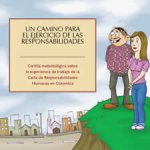

Diego ESCOBAR
Email : descobar_2001 rQo yahoo.com
Coordinator of the Regional Committee of the Charter for Colombia and Latin América.
More details here
Associated Topics to this author: Governance, Human Rights, and responsibility . Women . Communication . Citizenship . Social responsibility . Community responsibility . Responsible action .
26 July 2008
|
20 June 2008
|
Socialization Workshops - 20 June 2008
Five socialization workshops were held for community leaders from the municipalities of Andalucía, Puerto Tejada, and the Alto Menga district of Commune 2 in Cali, as well as for a few artists of Cali and the Fundación Foro staff. The idea was to start from the recognition of Human Rights and to link the responsibility of all society to the enjoyment of these rights, starting with the (...) |
Columbia 2007: A Series of Workshops and Working Papers - 18 March 2008
With the support of the Valle Sector Forum and Cinep (Center for Investigation and Popular Education), we organized several workshops in the Cauca Valley and Baranquilla (on youth development) which attracted several dozen people.
Various other meetings were held to promote the Charter: in Bogotá (with the community canteens), Buenaventura and Puerto Tejada (Valle Forum). We also met up with (...) |
Seven lessons learned from the Charter of Human Responsibilities’ process in Colombia in 2006 - 6 March 2007
Evaluation
The Colombian team of the Charter worked in 2006 on an internal reflection analysis on the concept of responsibility and the importance to put it in practice in the Colombian context, and on the dissemination of the Charter and the development of processes emphasising three sectors in three regions of the country: the youth, citizen leaders and women.
Thanks to a collaboration (...) |
Internal discussions - 9 December 2006
In the framework of the convention, 6 meetings were hold between the organizations of the regional platform created to socialize the information on the Charter. Some of these meetings devoted to a debate on the basis of several texts from the Alliance for a plural, responsible and socially responsible world, allowing to better locate and understand the whole process that was at the start of (...) |
Diffusion in the medias (Colombia, 2005) - 23 February 2006
The objective was to socialize the information on the Charter and to reveal the event of May 27, 2005. The main activity consisted in reaching the medias of the city to inform them on the Charter and the event, defining thus the importance of the activity and highlighting its projection rather than its possibility. We handed to each journalist concerned:
the prospectus of the event (...) |
The Charter of Human responsibilities in Colombia: a strategy for empowering civil society - 2 June 2005
Lille, December 2001: the text of a Charter for Human responsibilities is presented to 400 citizens from 120 countries and 25 social and professional backgrounds during the closing ceremony of the World Assembly organised by the Alliance for a Plural, Responsible and United World. Ethics, individual and collective responsibility, dignity, sustainable peace and common good are at the root of (...) |
Objectives and strategies - 20 April 2005
The Charter of Responsibilities must enable civil society to develop its own capacity for organisational and institutional empowerment and change stereotypes of political action that have existed up until now. Civil society must, in fact, contribute to the creation of a new type of governance by, for instance, reinforcing mechanisms of control over the communication media and over the (...) |
Activities in 2004 and results - 19 April 2005
Initial results of the work 1. The Cauca Valley Women’s Charter of Responsibilities 2. Establishment of a Charter steering group in Cali, called the Initiative Network for a Responsible Citizenship. One of its main objectives is to get together with other social groups and unite through action and reflection over the notion of responsibility. 3. Setting up of a Charter (...) |
Increasing awareness, Stimulating Appropriation - 8 April 2005
Educational and social methods |
Difficulties - 5 April 2005
The distributed budget.
We find ourselves in Colombia in a situation different from that of the other members of the Committee. We, in fact, began the work of disseminating the Charter early, i.e. in July 2003, in response to a call for initiatives and thus received an initial sum to make headway with the work. The debate within the Charter’s Steering Committee over voting methods and budget (...) |
Diego ESCOBAR DIAZ - 7 January 2005
Coordinator of the Regional Facilitation Committee of the Charter of Human Responsibilities for Latin America, Colombia. Researcher at the CINEP (Centro de Investigación y Educación Popular), has experience in topics related with peace, social movements, Civil Resistance and systematizing methodologies. He works in Human rights and human responsibilities, citizenship.
Labor experience: (...) |

 Presentation on a methodological booklet: Working experience with the Charter of Responsibilities in Colombia
A path for the exercise of responsibilities – with this title, this publication presents in a straight forward and practical way the road map for those who want to understand or study, promote and build the social utility of exercising human responsibilities in diverse contexts and different places around the world. As noted in the table of contents, the document includes 10 (...)
Presentation on a methodological booklet: Working experience with the Charter of Responsibilities in Colombia
A path for the exercise of responsibilities – with this title, this publication presents in a straight forward and practical way the road map for those who want to understand or study, promote and build the social utility of exercising human responsibilities in diverse contexts and different places around the world. As noted in the table of contents, the document includes 10 (...)
